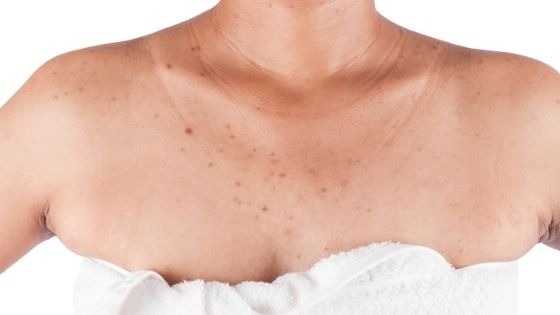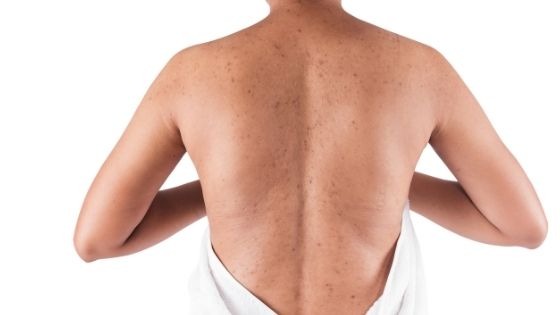Body Acne, Causes, and Treatments that Actually Work!

Acne can be a real pain. It's not just unsightly but also causes social anxiety and low self-esteem. However, if you have body acne, it doesn't mean that you are dirty or unclean.
The opposite is true. Most people with body acne wash too much and use harsh soaps on their skin! Most of us don't know why we get these pimples in the first place.
Let's learn more about this common condition together — it will help both your mind and skin! We'll give you all the details about what causes body acne, how to treat it.
We'll show you step by step how to eliminate those embarrassing pimples from your back and chest once and for all and keep them away forever! Please, keep reading!
What is body acne?
Acne vulgaris is a disease of the pilosebaceous unit that results in noninflammatory lesion types (open and closed comedones), inflammatory condition types (papules, pustules, and nodules), and varying degrees of scarring.
A widespread condition, AV happens mostly in adolescents. 85% of people have it at some point in their life. Acne can last a lifetime, with a 50.9 percent incidence of acne in females ages 20 to 29 and 26.3% in women ages 40 to 49 years old.
Acne is a skin condition characterized by blocked hair follicles that are filled with oil and dead cells. It manifests as blackheads, whiteheads, or pimples. Acne is most prevalent among teenagers, although it affects everyone. Acne can be challenging to treat.
Is body acne normal?
Body acne "is normal and frequent to begin in adolescence, coinciding with hormonal changes, but it can be maintained, if not treated, or begin in adulthood, associated or not with facial acne," says Dr. Nataniel Josue.
What causes body acne?
Acne develops when pores become clogged. So what type of acne you get depends on what clogs your pores.
While scientists are still trying to figure out why some people's skin seems more likely to develop acne, hormones may play a role.
Body acne is caused by the same factors that cause facial acne. Overactive oil glands, dead skin cells in excess, and acne-causing bacteria are three examples of this.
Here's how pimples form:
- A blockage occurs when oil and dead skin cells get trapped within the follicle (pore).
- The blockage forms a blackhead.
- When bacteria enter, the blackhead transforms into an inflamed pimple.
Back and upper-body acne is more common than leg acne.
The top part of the body, like the face, has a large number of sebaceous glands. These glands produce sebum (oil) to help keep moisture in balance, regulate temperature, and prevent infections caused by bacteria and other germs.
However, because so many of these glands are on the upper body, they are more prone to be clogged with excessive oil and dead skin cells.
The most common causes of acne are:
Testosterone
During puberty, a hormone called testosterone makes a person's body change. This hormone also makes a person's sexual organs grow.
The sebaceous glands are highly responsive to hormones. For example, it's believed that testosterone levels rise, causing the glands to create far more sebum than the skin requires.
Genes
Acne is hereditary. If your parents had acne, it's likely that you will, too.
According to one research, if your parents both had acne, you're more likely to get severe acne at an early age. It also discovered that if either one of your parents suffered from adult acne, you were more likely to do the same.
Polycystic ovary syndrome
PCOS is a severe hormonal disorder that affects one in 10 women of reproductive age and can lead to infertility and chronic health conditions like diabetes. Polycystic ovary syndrome is caused by an imbalance in the body's hormones, which leads to cysts forming in the ovaries. As a result, PCOS causes excessive hair growth, acne, weight gain, and small cysts inside the ovaries.
Pregnancy
Many women experience acne during the first three months of pregnancy, though it's often mild.
Hormones produced during pregnancy can cause the sebaceous glands to enlarge and produce more oil.
Acne Mechanica
Tight clothing, sports equipment, and other items might cause breakouts on your skin. In addition, when rubbing or applying pressure to the skin and then heating or sweating, it irritates and inflames follicles, causing acne mechanica.
Stress
There's no doubt that stress can aggravate acne. When you're stressed, your body produces the hormone cortisol. Cortisol signals the sebaceous glands to produce more sebum. As a result, you may have: Blackheads and whiteheads on the chest, back, shoulders, and neck.
Menstrual cycle
"Female adult acne is related with the menstrual cycle, where estrogens are very high in the first two weeks of menses, then progesterone takes over to produce a normal plasma level. Unfortunately, at this time, women who have already experienced acne report that it exacerbates during these two weeks," explains our Specialist Dr. Nataniel Josue.
Related "How dry skin causes acne, 6 reasons you don't know"
How to get rid of body acne?

Dr. Nataniel says that we can avoid body acne by drinking enough water to be healthy and not clean ourselves too much. In addition, we should wear moisturizers on our skin to keep it moist.
And, if you have acne, you can put creams or lotions on your skin that are gentle and that have prebiotics or ceramides in them. Besides, there are a few practical ways to treat body acne:
Over-the-counter medications
Benzoyl peroxide, salicylic acid, and sulfur are the most common ingredients in over-the-counter acne medications. They work by killing bacteria, drying out the skin, and reducing inflammation.
Prescription medications
If over-the-counter medications don't work, your doctor may prescribe a stronger medication, such as:
- Retinoids
- Antibiotics
- Hormonal therapies
Surgical procedures
Laser therapy and dermabrasion are two surgical procedures that can be used to treat body acne.
Home remedies
There are a few home remedies that may help reduce the appearance of body acne:
- Apply a cold compress to the affected area. This compress will help reduce inflammation and swelling.
- Apply a topical ointment or spot treatment to the affected area.
- Wash the skin once or twice a day with a gentle facial cleanser. Make sure to use lukewarm water instead of hot water because hot water can irritate the skin.
- Don't pop, squeeze or pick at your pimples. That will only lead to more severe irritation and inflammation.
- Avoid wearing tight clothing and using heavy cosmetics.
- Drink plenty of water to keep the skin hydrated.
Related: "How pineaple juice can treat acne, sun damage, and skin tone?"
Dietary changes
There is some evidence that suggests that dietary changes may help reduce the appearance of body acne:
- Eat foods that are low in sugar and saturated fat. Sugar can aggravate acne, and saturated fat can clog pores.
- Eat plenty of fruits and vegetables. Fruits and vegetables are high in antioxidants, which can help reduce inflammation.
- Drink plenty of water. Dehydrated skin is more prone to acne.
Get enough sleep.
Get at least eight hours of sleep each night to help reduce stress and prevent breakouts.
Wear sunscreen every day.
Wearing sunscreen every day will protect your skin from the sun's UV rays, which can irritate or inflame existing acne. It may not be a bad option to use face sunscreen for the body if you also need to use it on the face.
Can body acne scars go away?
To treat scars of acne, you need to follow an algorithmic approach that considers the different types of scars. Treatment should start with erythema if it is present.
Once erythema has been addressed, the focus should be on addressing atrophic scars, with the treatment determined by the type and severity of scarring present.
The combined treatment in a specific manner for a patient can offer the best chance for significant improvement.
Laser treatments
Laser treatments can be used to treat the scarred areas of the skin. For example, a particular type of laser treatment called fractional CO2 laser resurfacing may help improve acne scars.
Other types of lasers, such as intense pulsed light (IPL), or intense pulsed light (IPL) with radiofrequency, may also help treat post-acne scars.
Cryosurgery
If laser treatments are not appropriate for you or don't work, your doctor may recommend another treatment called cryosurgery.
Cryosurgery is the process of destroying the skin with an ice ball to remove scar tissue. Keep in mind that this type of surgery will leave thin scars and can be very painful.
Chemical peels
If laser treatments and cryosurgery aren't for you, your doctor may recommend a chemical peel treatment to reduce the appearance of acne scars.
A chemical peel is an acid solution applied to the skin which causes it to blister and peel away in about 10-14 days. The new skin that grows back is usually smoother and has fewer scars.
Subcision
If you have deep, pitted scars, your doctor may recommend a procedure called subcision. That is a process where the doctor uses a sharp instrument to break up the scar tissue. Subcision can help reduce the depth of the scar and make it less noticeable.
Fillers
If you have atrophic scars (depressed or sunken in), your doctor may recommend using a filler to help raise the skin and make the scar less noticeable. There are a variety of fillers available, including collagen, fat, and hyaluronic acid.
Skin grafts
In some cases, a skin graft may be needed to cover severe scarring. A skin graft is a piece of skin taken from another part of the body and transplanted to the area with scars. Keep in mind that this is a more invasive procedure and may leave a visible scar.
Microneedling
There is some evidence that suggests micro-needling can reduce the appearance of atrophic acne scars. During this procedure, a small roller with many tiny needles is rolled over the face to create hundreds of micro-injuries in the skin.
This treatment stimulates the production of new collagen and elastin fibers which may help reduce fine lines and textural irregularities, including scars.
Hopefully, one of these treatments will help reduce the appearance of your acne scars. However, if you're not happy with the results, always talk to your doctor to see if another treatment may be a better fit for you.
Conclusion
We hope you enjoyed reading our blog about body acne, its causes, and how to treat it. Read all of our articles if you're interested in understanding more about this condition or the other topics we cover on our website. Enjoy!
DISCLAIMER: buildyourbody.org does not provide medical advice, examination, and diagnosis.
Medically reviewed and approved by Nataniel Josue M D.
